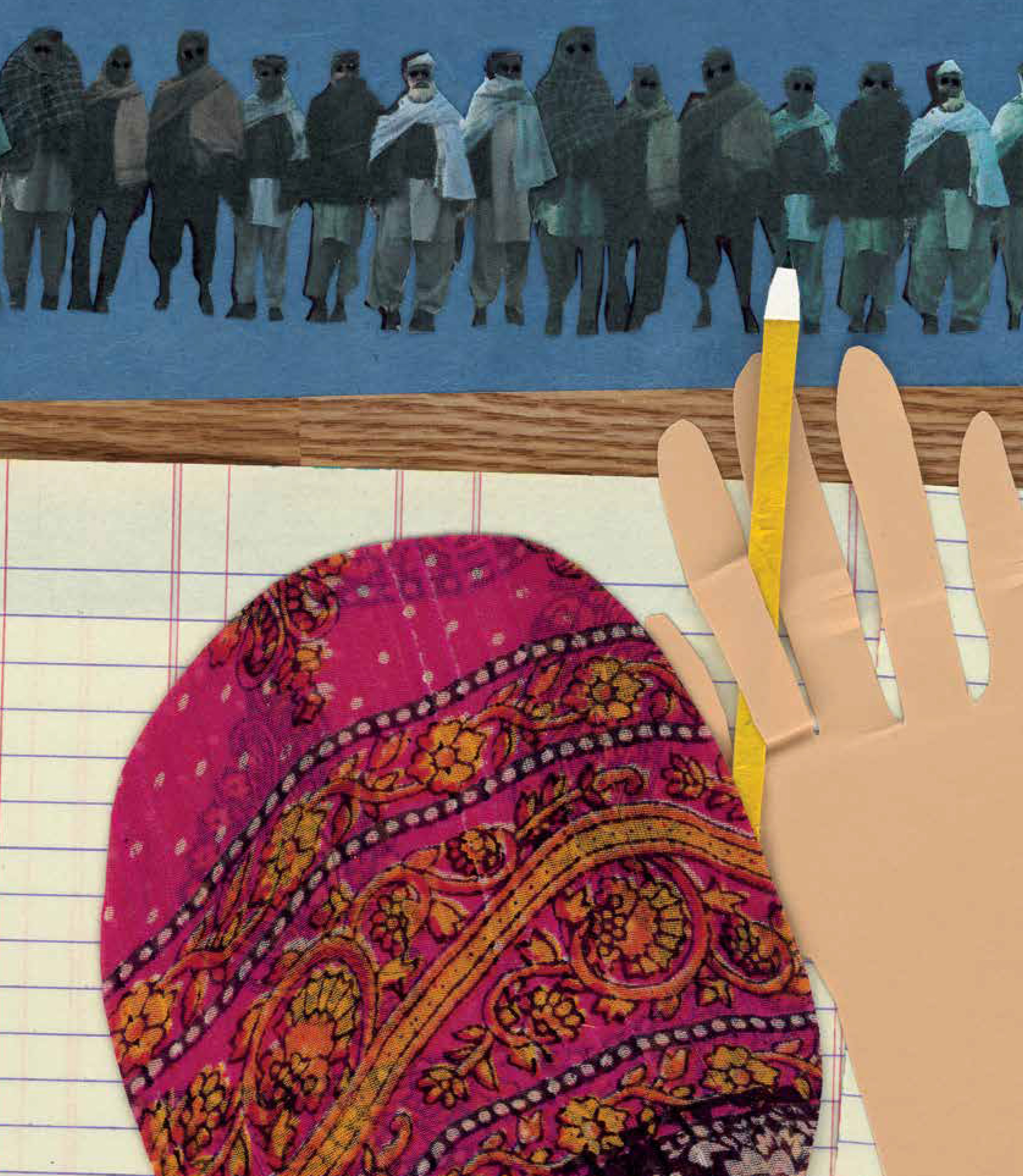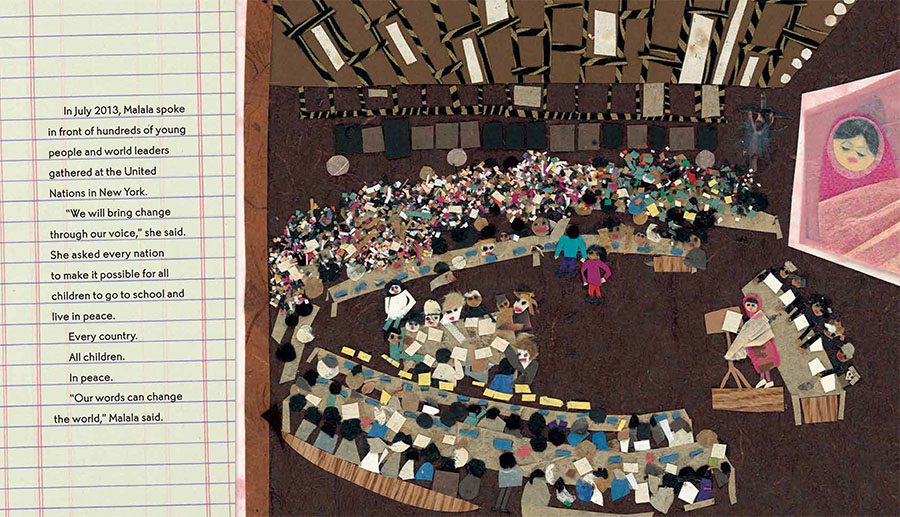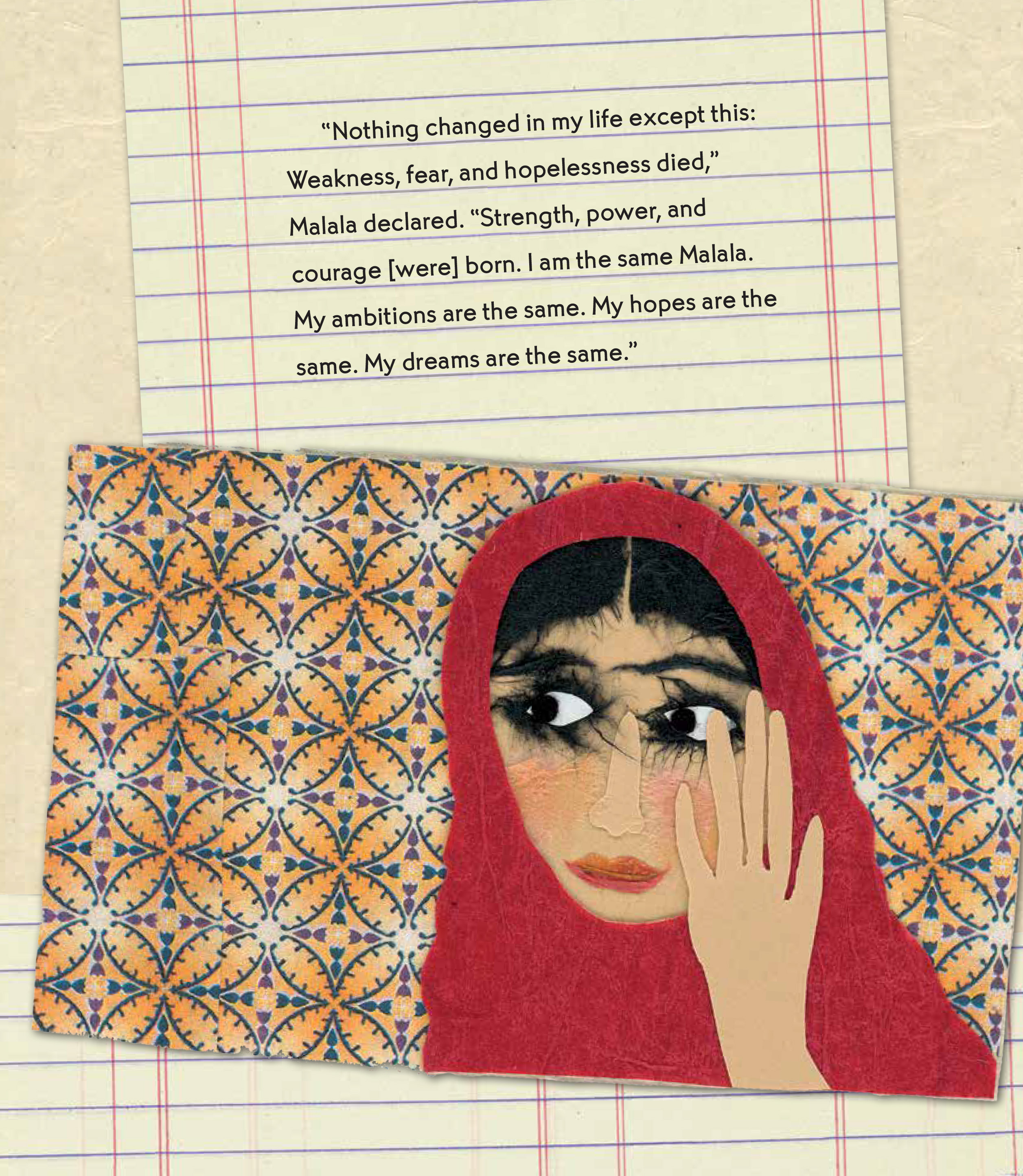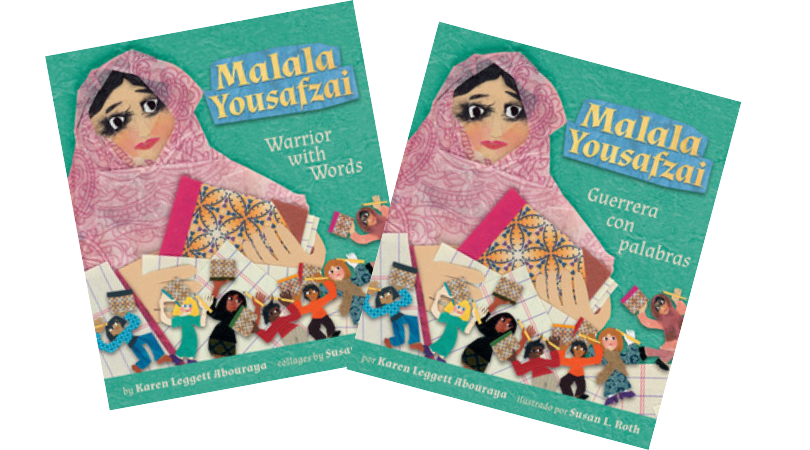Released this past January in both English and Spanish, Malala Yousafzai: Warrior with Words is the picture book biography of the amazing Nobel Peace Prize winner and brave, outspoken girl who continues to fight for the millions of children worldwide who are not able to go to school. In this interview for Women’s History Month, we chatted with author Karen Leggett Abouraya and illustrator Susan L. Roth about their inspiration for the book and the women they look up to:
1. Why did you want to create a picture book about Malala Yousafzai?
Karen Leggett Abouraya: I am intrigued with the power of young people to advocate for a cause and actually make a difference, whether it’s making a change in local laws like teens pushing for the right to vote at age 16 in their hometown or young women like Malala inspiring hundreds, maybe thousands, of young people to mobilize in support of girls education worldwide.
Susan L. Roth: I have always found Malala’s story amazing and inspiring. When I was invited to illustrate her story I certainly wanted to do it, even though the prospect was a little daunting. With encouragement from Karen, I mustered my courage, did my homework to the best of my ability, and the dream became the book!
2. Malala Yousafzai said “education is our basic right.” How can people get involved in helping provide education for all?
KLA: There are many organizations working on this issue locally and globally. Some are listed in the back of Malala Yousafzai: Warrior with Words and include the Malala Fund that Malala herself organized with her father several years ago. There are opportunities to raise funds, connect with girls overseas who may need help with scholarships (School Girls Unite), collaborate to address an issue or learn about philanthropy at a young age.
3. Books and pens are some of the most powerful tools out there. As someone who is a strong advocate for diverse voices and books, what would you say to someone that says we don’t need that?
 KLA: Words are power, as Malala says repeatedly, no matter how we communicate. Whether you are motivating people on social media, making posters to put up in schools and coffee shops or discovering a book about people of a different culture – words are the tool and words give you power. A fourth grader in Washington, D.C., heard Malala’s story and wrote, “Everybody can change the world with speech. We are strong.”
KLA: Words are power, as Malala says repeatedly, no matter how we communicate. Whether you are motivating people on social media, making posters to put up in schools and coffee shops or discovering a book about people of a different culture – words are the tool and words give you power. A fourth grader in Washington, D.C., heard Malala’s story and wrote, “Everybody can change the world with speech. We are strong.”
SLR: You mean besides shaking them and telling them to take a good look at the world around them? I think I might try to TELL them a few stories, first. Maybe I would take them for a long walk through Queens, New York, as a way to let them actually SEE and HEAR many diverse voices within a few colorful and inspiring blocks. If they seem it be receptive I might take them for a quick moveable lunch, with tastes of several delicious diversities, also found within a few blocks in Queens. And then I would preach the TRUTH to them while they were eating. Hopefully they would be begging for books by that time! Really, seriously, I do believe that the answer to this question is exposure. Diverse cultures are so endlessly fascinating. How could ANYONE resist?
4. Who are some other women that you look up to and/or admire, and why?
KLA: Maya Angelou is a woman who had a very challenging childhood but rose above those circumstances to become a beautiful poet, writer and woman of great influence. There is honesty, compassion and empathy in her work but rarely bitterness.
Shirley Chisholm was brave and outspoken when she became the first black woman elected to Congress and the first black candidate for a major party nomination for President. She was fearless and eloquent and one of my favorite Chisholm quotes, is, “If they won’t give you a seat at the table, bring a folding chair.”
Heidi is a fictional character, but she was a strong girl who spoke her mind when that was not an appropriate thing to do for girls. When children ask about a favorite book of mine when I was a child, I often list Heidi because she spoke up to her grandfather and had higher expectations for her disabled cousin than all the adults around her.
SLR: I may not be too brand new original with this response, but these are some of the women I love: Sonia Sotomayor, Ruth Bader Ginsburg, Elena Kagan, Dr. Gerti Cori (Nobel prize winner in medicine, 1947), Alexandria Ocasio-Cortez, Elizabeth Catlett (artist).

5. Karen, what made you want to go from journalism to children’s book author?
KLA: I never really left journalism behind – I just added children’s books as another way to connect people with information that could be valuable or interesting to them – and in this case, the people are children.
I started reviewing children’s books in print and on the radio and then had the opportunity to tell a story about modern Egypt: Hands Around the Library: Protecting Egypt’s Treasured Books. This book, also brilliantly illustrated with Susan L. Roth’s cut-paper collages, is the story of young protesters protecting the great library of Alexandria during the Arab Spring. With the new biography of Malala, I realize how much I enjoy telling the stories of young people willing to speak up for important causes. And I still continue writing articles for grown-ups about these topics, like my recent column in the Washington Post about the moral authority of young activists.
6. Susan, did you use any special materials for the illustrations in the book?
 SLR: YES! I started with the notebook and the paper in it, one I bought in India, actually. I brought that notebook to a very Pakistani restaurant in Queens, where I accosted a guy eating lunch. I said: If you are from Pakistan, PLEASE may I ask you a question? The man said YES! and FINE! and so I showed him my notebook. Can you tell where this is from? I asked. He said: It’s from Pakistan. It’s the kind of notebook I used in grammar school! Exactly like this? I said. YES! he said. This notebook was surely made in Pakistan, he said. I bought it in India, I said. Probably imported! he said. And so I used my actual notebook for Malala’s. And since I have not yet been lucky enough to get to real Pakistan, I made use of Queens, New York, in Jackson Heights as well as other rich pockets of Pakistani culture nearby, for imported fabrics and papers, for observations of people’s faces and costumes, and, of course, for occasional delicious (inspirational!) lunches.
SLR: YES! I started with the notebook and the paper in it, one I bought in India, actually. I brought that notebook to a very Pakistani restaurant in Queens, where I accosted a guy eating lunch. I said: If you are from Pakistan, PLEASE may I ask you a question? The man said YES! and FINE! and so I showed him my notebook. Can you tell where this is from? I asked. He said: It’s from Pakistan. It’s the kind of notebook I used in grammar school! Exactly like this? I said. YES! he said. This notebook was surely made in Pakistan, he said. I bought it in India, I said. Probably imported! he said. And so I used my actual notebook for Malala’s. And since I have not yet been lucky enough to get to real Pakistan, I made use of Queens, New York, in Jackson Heights as well as other rich pockets of Pakistani culture nearby, for imported fabrics and papers, for observations of people’s faces and costumes, and, of course, for occasional delicious (inspirational!) lunches.
Purchase a copy of the English version and Spanish version on our website.



2 thoughts on “Interview: Karen Leggett Abouraya and Susan L. Roth on Malala Yousafzai and Other Women Who Inspire Them”
Comments are closed.